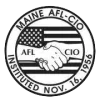Meet the Maine Fire Fighters Who Protect Our Naval Facilities & Serve Our Communities

From the time he was a child, Scott Lizotte had always wanted to be a firefighter. He grew up in Down East, Maine, but most of his extended family lived in the St. John Valley of Aroostook County and he always looked up to his grandfather and uncles who served in the fire department there. He joined the Jonesport Fire Department as a volunteer when he was a teenager and later enlisted in the Navy as a corpsman, a type of medical specialist.
“I love being a firefighter,” said Lizotte, who is President of the newly affiliated International Association of Fire Fighters (IAFF) Local F-316 at Cutler Naval station. “The type of work we do obviously comes with its challenges and when you grow up in a small, rural community like this, you know who the people are at every call you go to. But it’s something I’ve always taken pride in. It’s inspirational, it’s sad, it’s in your mind all the time. I always look forward to going to work and doing what I can to prevent tragedies and assisting however I can. It’s a cliché to say this, but it’s really a calling.”
After finishing a four-year stint in the service, Lizotte still had that “Navy pride” and didn’t totally want to leave the Navy behind, so he took a job as a fire fighter at the former Naval Air Station in Brunswick. When the base closed in 2011, he transferred to the VLF Transmitter Naval facility in Cutler, not far from where he grew up.
The fire fighters were originally organized under the American Federation of Government Employees in 1966 as an affiliate union. However, the workers didn’t have collective bargaining rights until the federal Civil Service Reform Act of 1978 was enacted. But while that law grants federal employees the right to grievance procedures and to bargain over working conditions, only Congress can set their wages and benefits. Lizotte eventually rose through the ranks of his local to become President of the 10-member fire fighter union. After he recently lead a very complicated, but amicable, separation from AFGE, the Cutler firefighters joined the IAFF and the Professional Fire Fighters of Maine’s 5th district with the Portsmouth Naval Shipyard (PNSY) and Bath Iron Works fire fighters.
Federal fire fighters like Lizotte — and those who work for other federal agencies and military installations — are similar to municipal firefighters in that their responsibilities include responding to fire alarms, hazardous materials incidents, and medical emergencies. They also provide mutual aid to other fire departments in their communities. But unlike their municipal counterparts, federal fire fighters must work grueling 72-hour weeks and many continue to work a 24 on 24 off shift schedule, which tends to disrupt work-life balance.
Last year, IAFF members successfully lobbied Congress to pass a provision in the National Defense Authorization Act that gives federal fire fighters the ability to better manage their challenging schedules to improve work-life balances. PNSY firefighter Kyle Moser — President of the Shipyard Professional Fire Fighters (IAFF-123) and 5th District Vice President of the Professional Firefighters Fire Fighters of Maine‚ says federal facilities across the nation are having trouble filling positions, but the new law could help alleviate the problem.
“If we can get that scheduling reform implemented, that’s a good recruitment and retention tool and I think we’ll have a lot more people interested in our job,” said Moser.
Unfortunately, unlike municipal firefighters in Maine and most other states, if federal fire fighters come down with occupational illnesses like cancer or heart disease, the burden of proof is on them to prove it is work related when applying for workers’ compensation benefits. Without this presumptive benefit, it's extremely difficult to specify the precise exposure that caused these diseases. IAFF members have successfully lobbied the entire Congressional delegations of Maine and New Hampshire to back the Federal Firefighters Fairness Act (HR 2499), which would place the burden of proof of on the employer to prove these conditions are not work related.
Lizotte says that being part of a union has been an integral part of his career as it improves working conditions, workplace safety and other protections. It’s a right all workers deserve, but he says participation is the key to any union’s success.
“A union is really what the members make of it,” he says. “It’s an investment in an organization that takes a lot of hard work and dedication, but it also gives you a voice and a platform in the workplace. It allows you to feel comfortable expressing your opinions about management policies and gives you the power to influence laws that impact your job. It’s an investment in your future."
